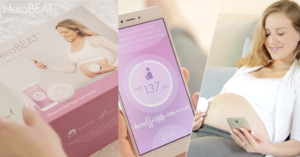
WATCH: HeraMED eliminates stress for pregnant women with the first compact medical-grade mobile fetal heart rate monitor that’s synced to your smartphone.
– Israeli dad invents fetal heart rate monitor for home use
By Abigail Klein Leichman
When David Groberman’s wife, Odelia, was pregnant with their third child, some concerns sent the couple scurrying from one medical appointment to the next.
After arranging for babysitting, driving to the appointment, finding parking, and waiting, the actual fetal monitoring exam took only several minutes – and then came another round of waiting for the physician to analyze results.

HeraBEAT lets moms check fetal heartrate anytime, anywhere. – Photo courtesy of HeraMED
Fortunately, the story ended happily: their son is now a healthy six-year-old. And all the anxiety, stress and inconvenience also ended up for the best because it led David Groberman to cofound HeraMED, a med-tech startup that has developed HeraBEAT, a unique smartphone-based fetal heartbeat monitor for home use.
Expectant mothers can use HeraBEAT to monitor their fetus’ heartbeat and share that data securely via the cloud with an authorized healthcare provider – without leaving home or office.
The device is manufactured in Israel and was soft-launched domestically in mid-2018. International roll-out is starting in the UK and Australia.
Headquartered in Netanya, HeraMED completed its IPO on the Australian Securities Exchange in December, received regulatory approvals in Australia, Israel, UK, Europe, India and Brazil, and soon will apply to the US Food & Drug Administration. Clinical trials are in progress in Israel, UK, Australia and US.
The Mayo Clinic, one of HeraMED’s shareholders, is testing HeraBEAT as part of its OB Nest program, which relies on self-monitoring tools and other means of “demedicalizing” the experience of pregnancy for women at low risk of complications.

Pregnant woman in third trimester of pregnancy (last month) – Photo: Wikimedia/Petar Milošević
Groberman says that HeraBEAT’s hardware and software is optimized to enhance the accuracy, efficiency and ease-of-use of conventional ultrasound monitoring technology, performing as well as or even better than professional machines.
“We are really disruptive, changing the pregnancy experience by updating an old technology of pregnancy monitoring and reshaping how women and physicians cooperate,” says Groberman, a mechanical and biomedical engineer with 15 years of experience as a consultant and service provider for companies including Philips, GE and Medtronic.
“There are other handheld Doppler devices in the market, but they use an inferior narrow beam and it creates a substantial challenge to find the fetal heartbeat even for professionals, not to mention home users. We’ve overcome technological challenges to make the beam ultra-wide using a unique transducer, so the reading takes shorter to accomplish.”
Proprietary “Smart Search” technology enables the woman to find the fetal heartbeat quickly and accurately without any medical training.
“It’s like Waze for pregnant woman. She starts with the device on her bellybutton and we guide her step by step where to move the device. In seconds to several minutes – depending on the size and position of the baby — she’ll find the spot and then the device switches automatically from search to measurement mode.”
The second unique aspect of HeraBEAT is an integrated optical sensor that extracts the signals from the mother’s heartbeat so that only the baby’s heartrate is measured. The third distinguisher is an app that connects the device wirelessly to a smartphone.
“In the last year we have gotten a lot of positive feedback from medical entities,” Groberman tells ISRAEL21c.
“HeraBEAT is a consumer device but we are looking to have a genuine medical impact, so we’re very happy with cooperation from the medical community. It is not easy to persuade OB/GYNs that it works and can have a positive impact but once they try it and see the benefits it’s almost an immediate click. We really foresee most of the medical community embracing the technology.”
Dr. Josef Tovbin, chief of labor and delivery at Assuta University Hospital in Ashdod, said HeraBEAT is “a first step to calming nerves when you haven’t felt the baby move in a while. I believe at-home solutions can save a lot of time and worry, and reduce the number of unnecessary hospital visits.”
The name of the company is a double play on words: herayon is “pregnancy” in Hebrew, and Hera is the Greek goddess of fertility and childbirth.
HeraBEAT is its first product but others are in the pipeline.
“Our vision is to lead a revolution in pregnancy care, offering a future of home-based, continuous and insightful monitoring, changing today’s obsolete standards to a future of better care at lower cost,” says Groberman.
One future HeraMED product now being co-developed at the Mayo Clinic is Orion, which uses artificial intelligence to analyze pregnant patients’ medical records in order to identify existing and new risk factors for possible complications before they become a problem.
For more information, click here
View original Israel21c.org publication at:
https://www.israel21c.org/israeli-dad-invents-fetal-heart-rate-monitor-for-home-use/
ABOUT THE AUTHOR:
Abigail Klein Leichman is a writer and associate editor at ISRAEL21c. Prior to moving to Israel in 2007, she was a specialty writer and copy editor at a major daily newspaper in New Jersey and has freelanced for a variety of newspapers and periodicals since 1984.







 Israeli New Shekel Exchange Rate
Israeli New Shekel Exchange Rate